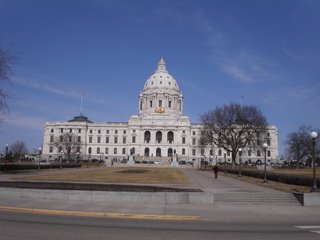Friday, March 31, 2006
Gatsby

About a month ago, my impending move to the Midwest inspired me to experience anew one of America's great novels, The Great Gatsby. Why this novel when so many novels speak of the Midwest? Mainly since its author hailed from St. Paul, Minnesota, the same region which would be my new home. Having finished the novel yesterday, I was struck again by the number of themes about which this novel speaks. It would be enough if the book was simply a treatise on greed and avarice. It would also be enough it it were merely a portrait of the decadence of the decade preceding the Great Depression. But what struck me most clearly was the author's sense of his home, and how he had failed to relate to the East. My antipathy to the East is grounded in my youth, growing up as a Californian. But there is something altogether different about Fitzgerald's yearning for the Midwest. Having lived in this region once before, I am a mere observer of this yearning. I do not claim to fully participant in it. If my readers will indulge a pretentious first post, allow me to quote the quintessential passage concerning the Midwest in this fine novel:
One of my most vivid memories is of coming back West from prep school
and later from college at Christmas time. Those who went farther than
Chicago would gather in the old dim Union Station at six o'clock of a
December evening, with a few Chicago friends, already caught up into
their own holiday gayeties, to bid them a hasty good-by. I remember
the fur coats of the girls returning from Miss This-or-that's and
the chatter of frozen breath and the hands waving overhead as
we caught sight of old acquaintances, and the matchings of invitations:
"Are you going to the Ordways'? the Herseys'? the Schultzes'?"
and the long green tickets clasped tight in our gloved hands.
And last the murky yellow cars of the Chicago, Milwaukee and St. Paul
railroad looking cheerful as Christmas itself on the tracks beside
the gate.
When we pulled out into the winter night and the real snow, our snow,
began to stretch out beside us and twinkle against the windows, and the
dim lights of small Wisconsin stations moved by, a sharp wild brace
came suddenly into the air. We drew in deep breaths of it as we walked
back from dinner through the cold vestibules, unutterably aware of our
identity with this country for one strange hour, before we melted
indistinguishably into it again.
That's my Middle West--not the wheat or the prairies or the lost Swede
towns, but the thrilling returning trains of my youth, and the street
lamps and sleigh bells in the frosty dark and the shadows of holly
wreaths thrown by lighted windows on the snow. I am part of that, a
little solemn with the feel of those long winters, a little complacent
from growing up in the Carraway house in a city where dwellings are
still called through decades by a family's name. I see now that this
has been a story of the West, after all--Tom and Gatsby, Daisy and
Jordan and I, were all Westerners, and perhaps we possessed some
deficiency in common which made us subtly unadaptable to Eastern life.
Even when the East excited me most, even when I was most keenly aware
of its superiority to the bored, sprawling, swollen towns beyond the
Ohio, with their interminable inquisitions which spared only the
children and the very old--even then it had always for me a quality of
distortion. West Egg, especially, still figures in my more fantastic
dreams. I see it as a night scene by El Greco: a hundred houses, at
once conventional and grotesque, crouching under a sullen, overhanging
sky and a lustreless moon. In the foreground four solemn men in dress
suits are walking along the sidewalk with a stretcher on which lies a
drunken woman in a white evening dress. Her hand, which dangles over
the side, sparkles cold with jewels. Gravely the men turn in at a
house--the wrong house. But no one knows the woman's name, and no one
cares.
After Gatsby's death the East was haunted for me like that, distorted
beyond my eyes' power of correction. So when the blue smoke of brittle
leaves was in the air and the wind blew the wet laundry stiff on the
line I decided to come back home. (Great Gatsby, Chapter 9, pages 183-85, Simon and Schuster, 1992)
My family will begin to build a life here, far away from both coasts. As I begin this chronicle, I thought it appropriate to contemplate one man's feelings of this vast region of his and my country. A region easy to forget, but abounding in possibility.